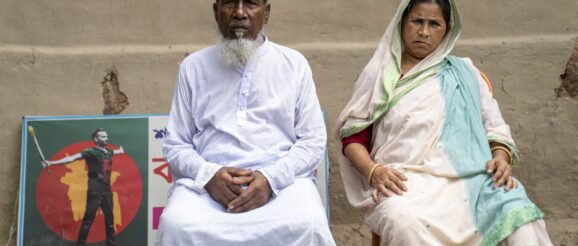Bangladesh marks a year since student uprising overthrew regime

BABANPUR, Bangladesh — The monsoon rains lash down on this remote village in northern Bangladesh. Outside a modest mud house, several cows chew lazily on cud inside their pens, while a hen struts across the sodden courtyard, her five chicks in tow.
Abu Sayed’s elderly parents sit quietly on the veranda, staring at the deluge, their minds seemingly elsewhere.
To an unsuspecting passerby, it looks like a peaceful scene — albeit an impoverished one.
Some show him with his arms outstretched, bearing his chest as he confronts police on July 16 last year outside his university in the northern district of Rangpur, just moments before officers shot him four times at close range.
His death, and the events surrounding it, were part of one of the most significant political upheavals in Bangladesh in decades.

Thirty-six days of nationwide unrest left as many as 1,400 people dead and thousands more injured, mostly at the hands of the security forces, according to the United Nations.
Other posters bear the words shahid — the Arabic word for “martyr” — across them.
They are a constant reminder to his family of his role in the student-led protests that started earlier that month — and the price he paid.
“My son graduated with honors,” he says, his voice trembling with emotion. “He really struggled. I couldn’t afford his education, so he worked and paid for it himself. He was about to get a job when the protests began. Now he’s a martyr. When I think of it, my eyes fill with tears and my heart aches.”

Parvez Ahmad Rony for
Sayed’s mother, Monowara Khatun, sighs deeply. “I look at my son’s photo every day,” she says. “But it brings no peace. My days are filled with pain. He loved me so much.”
Sayed’s shooting was captured live on television. The footage showed him unarmed and posing no threat. It quickly went viral and marked a turning point in the protests, which had begun as demands to reform civil service job quotas, 30% of which were reserved for descendants of freedom fighters from the 1971 War of Independence.
Sayed died within 20 minutes of being shot.
They ended with Hasina fleeing to India by helicopter. She now faces charges of crimes against humanity in Bangladesh.

K M Asad/AFP via Getty Images
Meanwhile, a tribunal has been set up to bring to justice those responsible for the deaths during the protests — but the process is taking time.
A growing sense of disillusionment
But 12 months on, a growing sense of disillusionment is sweeping across the country.
Critics accuse the new government of failing to tackle mob violence, and attacks on women and minority groups.
At the same time unemployment remains high.
Anu Muhammad, an economist based in the town of Savar, just north of Dhaka, says internal divisions within the coalition are partly to blame.
“Some groups were very much intolerant, some groups were secular,” he says, “so these were the differences. People are getting more and more frustrated because of the inaction, because of the lack of coordination among themselves, lack of coordination with the government and bureaucracy, government and police, government and judiciary.”
The protection of Bangladesh’s minority communities, especially Hindus, was one issue about which hopes were highest.
A wedding is underway. The bride is resplendent in red and gold. The groom is adorned with a garland of fresh flowers.
Adrita Roy, a drama student, who took part in last year’s protests, says it’s a misconception that Hasina’s Awami League political party protected her community.
“My grandfather was a Hindu freedom fighter,” she says. “All of his properties were confiscated by Awami League leaders, and they literally made a party office out of his ancestral home. These were the things that were going on.”
But she adds that despite promises made by Yunus to protect minorities, little has changed.

Parvez Ahmad Rony for
“Before the Yunus government came to power, he promised he would take care of the minorities,” she says, “which was very reassuring. But then the Awami League propaganda started flooding in. That’s when the government should have played a stronger role and prevented the very big incidents that have happened over the last couple of months.”
“We are simply not a mature democracy”
Yunus’ press secretary, Shafiqul Alam, defends the administration’s record on tackling crime.
He points to reforms in law and order, human rights, and transparency as evidence of progress.
“Some of these guys who criticize us, they wanted us to behave like a very mature democracy, which Bangladesh is not. It’s not like the United Kingdom or Scandinavian countries. We’re simply not a mature democracy.”
“Abu Sayed gave his life for his country. Now I ask the government for justice.”
Only then, he says, will he and his wife find peace.

Parvez Ahmad Rony for
